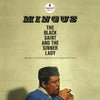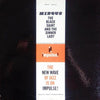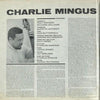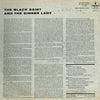







Charles Mingus - The Black Saint And The Sinner Lady
Charles Mingus – double bass, piano, composer [click here to see more vinyl featuring Charles Mingus]
Jerome Richardson – soprano and baritone saxophone, flute
Charlie Mariano – alto saxophone
Dick Hafer – tenor saxophone, flute
Rolf Ericson – trumpet
Richard Williams – trumpet
Quentin Jackson – trombone
Don Butterfield – tuba, contrabass trombone
Jaki Byard – piano
Jay Berliner – Classical guitar
Dannie Richmond – drums
Bob Hammer – arranger
1 LP, gatefold old-style tip-on jackets
Original analog Master tape : YES
Heavy Press : 180g
Record color : black
Speed : 33RPM
Size : 12”
Stereo
Studio
Record Press : Quality Record Pressings
Label : Acoustic Sounds Series
Original Label : Impulse
Recorded January 20, 1963 in New York City
Engineered by Bob Simpson
Produced by Bob Thiele
Remastered by Ryan K. Smith
Originally released in 1963
Reissued in 2021
Awards:
1000 Recordings you must hear before you die - Ranked 39
Tracks:
Side A :
- Solo Dancer (Stop! And Listen, Sinner Jim Whitney!)
- Duet Solo Dancers (Heart's Beat And Shades In Physical Embraces)
- Group Dancers ([Soul Fusion] Freewoman And Oh This Freedom's Slave Cries)
Side B :
- Trio And Group Dancers (Stop! Look! And Sing Songs Of Revolutions!)
- Single Solos And Group Dance (Saint And Sinner Join In Merriment On Battle Front)
- Group And Solo Dance (Of Love, Pain, And Passioned Revolt, Then Farewell, My Beloved, 'til It's Freedom Day)
Reviews :
"The Black Saint and the Sinner Lady is one of the greatest achievements in orchestration by any composer in jazz history. Charles Mingus consciously designed the six-part ballet as his magnum opus, and -- implied in his famous inclusion of liner notes by his psychologist -- it's as much an examination of his own tortured psyche as it is a conceptual piece about love and struggle. It veers between so many emotions that it defies easy encapsulation; for that matter, it can be difficult just to assimilate in the first place. Yet the work soon reveals itself as a masterpiece of rich, multi-layered texture and swirling tonal colors, manipulated with a painter's attention to detail. There are a few stylistic reference points -- Ellington, the contemporary avant-garde, several flamenco guitar breaks -- but the totality is quite unlike what came before it. Mingus relies heavily on the timbral contrasts between expressively vocal-like muted brass, a rumbling mass of low voices (including tuba and baritone sax), and achingly lyrical upper woodwinds, highlighted by altoist Charlie Mariano. Within that framework, Mingus plays shifting rhythms, moaning dissonances, and multiple lines off one another in the most complex, interlaced fashion he'd ever attempted. Mingus was sometimes pigeonholed as a firebrand, but the personal exorcism of Black Saint deserves the reputation -- one needn't be able to follow the story line to hear the suffering, mourning, frustration, and caged fury pouring out of the music. The 11-piece group rehearsed the original score during a Village Vanguard engagement, where Mingus allowed the players to mold the music further; in the studio, however, his exacting perfectionism made The Black Saint and the Sinner Lady the first jazz album to rely on overdubbing technology. The result is one of the high-water marks for avant-garde jazz in the '60s and arguably Mingus' most brilliant moment." AllMusic Review by Steve Huey
“It is not unusual to hear Charles Mingus chronicled as one of the greatest jazz composers and band leaders in history. The double bassist and pianist was an integral force in the development of complex improvisational jazz, intermingling hard bop, third stream, free jazz and classical. He collaborated with fellow icons including Duke Ellington, Louis Armstrong, Charlie Parker and Dizzy Gillespie. Over his career at Atlantic and Impulse, his prodigious output included titles like Pithecanthropus Erectus (1956), Mingus Ah Um (1959) and The Black Saint And The Sinner Lady (1963). These releases are considered among the finest in jazz lore with Giant Steps, Time Out and Kind Of Blue. He remained a potent force in music, and worked with Joni Mitchell (on her appropriately titled album, Mingus) at the time of his death.
Universal Music Group has released a re-mastered 180-gram vinyl of The Black Sinner And The Saint Lady as part of the Acoustic Sounds Series. The compositional scope and instrumental range of this stellar 11-piece ensemble is compelling. Conceived as a single piece divided into six movements, Mingus describes it as ethnic folk dance music, with motifs that draw from jazz, classical, African and Spanish themes. It is a challenging album to deconstruct song-by-song. There is a unique polyrhythmic, hypnotic resonance. The first track of this “aural ballet” “Solo Dancer” kicks off with an accelerated march-time drum with a chorus of horns and reeds creating a sultry atmosphere. As the saxophone and trumpet add texture to the driving tempo, soprano saxophone (countered by saucy horns) creates an emotional crescendo. The second part of the suite (“Duet Solo Dancers”) begins with an ethereal piano run and is joined by the full orchestra. At the 2:10 mark, there is a pulsating, gritty interlude that grows with ferocity and features underlying deep brass, and crisp, almost shrill trumpet and trombone notes that push tonal boundaries. The first part of the album’s third song, ”Group Dancers” concludes Side A. Again, the counterpoint of foreboding piano and horn accents leads to a sinewy melodic flow. Mingus’ adroit double bass guides the movement seamlessly. A certain highlight is the flamenco guitar run by Jay Berliner which leads to a tempo-shifting almost bebop modulation. Then classical piano exchanges with sophisticated fully orchestrated punctuation is sustained by by fierce saxophone and trumpet.
On Side B, “Trio And Group Dancers” is the epitome of inspired arrangement and grandiose “street” resonance, thanks to trumpet and sax, with a rapidly increasing tempo. This performance showcases the gravitas of the expanded instrumental lineup. It is multi-faceted and varies time signatures (especially a 3/4 shift). One of the highlights is Mingus’ dramatic piano solo. The audacious vision of this music puts Mingus in the rarefied air of legends like Ellington, Billy Strayhorn, Gil Evans, Bob Brookmeyer and Quincy Jones. The opus morphs into two other complex structures (“Single Solos And Group Dance”/“Group And Solo Dance”) that reprise the flamenco guitar against an alto saxophone. When the band explodes, there is a wild tapestry of Latin and African-infused rhythms, and a marimba that adds another musical element. There is a return to the central melody, as the trombone, horns and reeds provide slow-burning intensity. Then the band shifts from frenetic energy to bluesy articulation with a lone saxophone at the conclusion.
The Black Saint And The Sinner Lady is among the greatest albums in the annals of jazz. The instrumental gravitas and orchestral complexity both challenge and reward the listener. It is representative of the huge presence of Charles Mingus in what many consider to be the most creative and prolific jazz era. The re-mastered vinyl sounds vibrant. Even with the layers of instrumentation, the mix is crisp, balanced and never dense. This 180-gram pressing (QRP) is excellent and the unprecedented, candid liner notes are more than intriguing.” Robbie Gerson, Audiophile Audition, December 2021
Ratings :
AllMusic : 5 / 5 ; Discogs : 4.63 / 5 ; Audiophile Audition : 5 / 5



